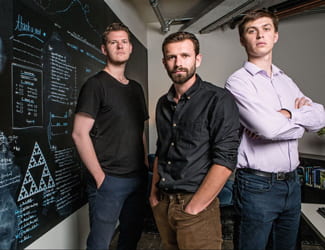

NEWSROOM
University astrophysicists taking their venture to the skies
Zenno Astronautics is a space flight systems company founded by three students of the University of Auckland. With the help of the Centre for Innovation and Entrepreneurship they have successfully managed to go from idea to investment.
Zenno is developing space exploration software as well as propulsion systems for small satellites – CUBESATS – which would extend their time in orbit and allow them to work cohesively in formation. They aim to not only eliminate space debris, but also to develop the commercial viability of the space market overall.
Zenno Astronautics are focussed on easing the industry pain point of satellites losing energy in orbit. While technology has allowed us to shrink the size of satellites to the size of a loaf of bread, and launch satellites within a few years, the internal systems have not been so easy to scale down. In a lower orbit – within 2000 kilometres of the surface – satellites experience drag, which eventually causes them to fall. The traditional method of storing propellant within the satellite to correct orbital course is no longer possible. To counter this problem, Zenno are developing hardware using physics principles which have been idle since the 1960s.
Zenno’s solution utilises principles much like those applied in sailing, where the environment is used to help propel the vehicle. Satellites will use the magnetic fields of planet earth and a generated field from the satellite. Combined with engineering capability only possible in the last couple of years, Zenno now has all the pieces needed to engineer with the first stage being electromagnetic flight. The possibilities of this technology are not only that CUBESATs can correct their course, but also that they can position themselves in relation to each other, assemble themselves into a larger structure launched on multiple rockets, create dynamic structures – the possibilities are endless.
Zenno comprise of Will Haringa (Bachelor of Commerce/Bachelor of Arts), Max Arshavsky (Bachelor of Engineering) and Sebastian Wieczorek (Bachelor of Engineering). Their venture idea was sparked during their involvement in the University’s Auckland Programme for Space Systems. They went on to enter and win the Business School’s Velocity $100K challenge, ultimately winning $25,000 in seed capital. They were then supported to develop their concept through an incubation programme known as VentureLab, also run by the Centre for Innovation and Entrepreneurship. With a sound business plan in place, UniServices have since provided Zenno with seed funding through the University of Auckland Inventors Fund to support the development of their technology. Business Director William says “The Centre for Innovation and Entrepreneurship has played an important part in the formative years of Zenno. It served both as a testbed from which we validated our value proposition, as well as offering support to move into the execution and growth phase.”
While the team have the makings of a Silicon-Valley start-up, they see the benefits of staying in New Zealand. New Zealand’s environment is ideal in a number of ways. The lack of overhead traffic is of great benefit, as ascertained by Rocket Lab. As a result of Rocket Lab’s success, New Zealand now has a space industry and space agency. Though both companies deal in satellites, there is no overlap. Rocket Lab are carrying things to orbit whereas Zenno Astronautics focus is on facilitating operations in orbit.
The Zenno Astronautics team also believe that New Zealand has an ideal entrepreneurial environment for startups; instead of maintaining existing systems, innovators can come forward to try outlandish ideas, and make mistakes during the learning process without detrimental risk. It is a unique environment that Max Arshavsky says we should not take for granted. “It is like a trampoline park with the things strapped to you. You can’t hurt yourself here. I come from Russia. In Russia, I think this kind of business would not be possible. First of all, it would take you a few years to register a company. Here we do it online for $150. Secondly, you would be worried about actually surviving. In New Zealand if you are a complete failure you can try again. You are going to have a house, you are going to have food and you are not going to starve. Why not attempt to do something that has true meaning? What do we have to lose? ”
Zenno Astronautics currently have software on the market and predict they will be ready to launch CubeSats in the next 2-3 years.
Photography by Damien Van Der Vlist on behalf of M2 magazine


Zenno Astronautics is a space flight systems company founded by three students of the University of Auckland. With the help of the Centre for Innovation and Entrepreneurship they have successfully managed to go from idea to investment.
Zenno is developing space exploration software as well as propulsion systems for small satellites – CUBESATS – which would extend their time in orbit and allow them to work cohesively in formation. They aim to not only eliminate space debris, but also to develop the commercial viability of the space market overall.
Zenno Astronautics are focussed on easing the industry pain point of satellites losing energy in orbit. While technology has allowed us to shrink the size of satellites to the size of a loaf of bread, and launch satellites within a few years, the internal systems have not been so easy to scale down. In a lower orbit – within 2000 kilometres of the surface – satellites experience drag, which eventually causes them to fall. The traditional method of storing propellant within the satellite to correct orbital course is no longer possible. To counter this problem, Zenno are developing hardware using physics principles which have been idle since the 1960s.
Zenno’s solution utilises principles much like those applied in sailing, where the environment is used to help propel the vehicle. Satellites will use the magnetic fields of planet earth and a generated field from the satellite. Combined with engineering capability only possible in the last couple of years, Zenno now has all the pieces needed to engineer with the first stage being electromagnetic flight. The possibilities of this technology are not only that CUBESATs can correct their course, but also that they can position themselves in relation to each other, assemble themselves into a larger structure launched on multiple rockets, create dynamic structures – the possibilities are endless.
Zenno comprise of Will Haringa (Bachelor of Commerce/Bachelor of Arts), Max Arshavsky (Bachelor of Engineering) and Sebastian Wieczorek (Bachelor of Engineering). Their venture idea was sparked during their involvement in the University’s Auckland Programme for Space Systems. They went on to enter and win the Business School’s Velocity $100K challenge, ultimately winning $25,000 in seed capital. They were then supported to develop their concept through an incubation programme known as VentureLab, also run by the Centre for Innovation and Entrepreneurship. With a sound business plan in place, UniServices have since provided Zenno with seed funding through the University of Auckland Inventors Fund to support the development of their technology. Business Director William says “The Centre for Innovation and Entrepreneurship has played an important part in the formative years of Zenno. It served both as a testbed from which we validated our value proposition, as well as offering support to move into the execution and growth phase.”
While the team have the makings of a Silicon-Valley start-up, they see the benefits of staying in New Zealand. New Zealand’s environment is ideal in a number of ways. The lack of overhead traffic is of great benefit, as ascertained by Rocket Lab. As a result of Rocket Lab’s success, New Zealand now has a space industry and space agency. Though both companies deal in satellites, there is no overlap. Rocket Lab are carrying things to orbit whereas Zenno Astronautics focus is on facilitating operations in orbit.
The Zenno Astronautics team also believe that New Zealand has an ideal entrepreneurial environment for startups; instead of maintaining existing systems, innovators can come forward to try outlandish ideas, and make mistakes during the learning process without detrimental risk. It is a unique environment that Max Arshavsky says we should not take for granted. “It is like a trampoline park with the things strapped to you. You can’t hurt yourself here. I come from Russia. In Russia, I think this kind of business would not be possible. First of all, it would take you a few years to register a company. Here we do it online for $150. Secondly, you would be worried about actually surviving. In New Zealand if you are a complete failure you can try again. You are going to have a house, you are going to have food and you are not going to starve. Why not attempt to do something that has true meaning? What do we have to lose? ”
Zenno Astronautics currently have software on the market and predict they will be ready to launch CubeSats in the next 2-3 years.
Photography by Damien Van Der Vlist on behalf of M2 magazine
EMAIL
CIE@AUCKLAND.AC.NZ
POSTAL ADDRESS
THE UNIVERSITY OF AUCKLAND BUSINESS SCHOOL
PRIVATE BAG 92019, AUCKLAND













